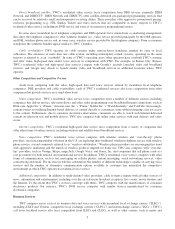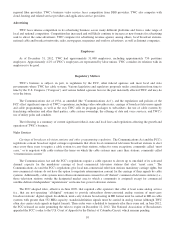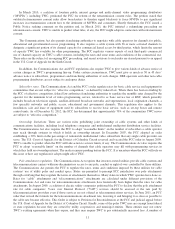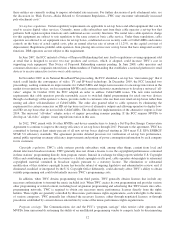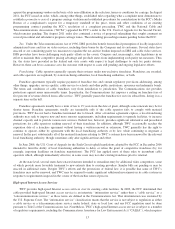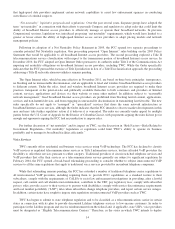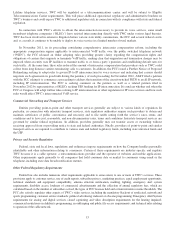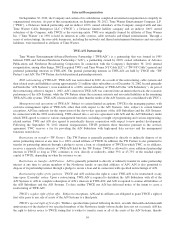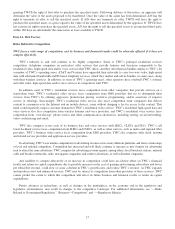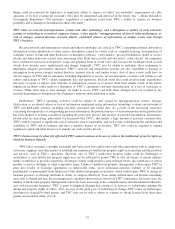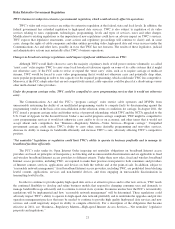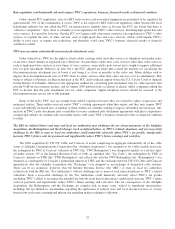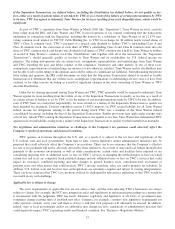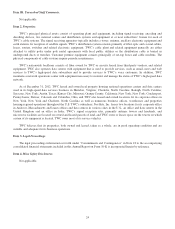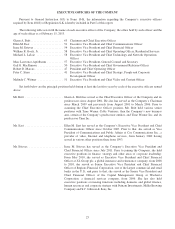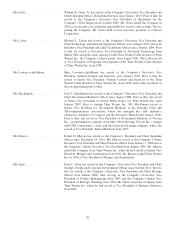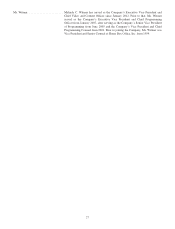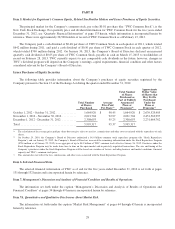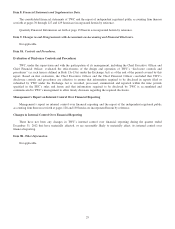Time Warner Cable 2012 Annual Report Download - page 29
Download and view the complete annual report
Please find page 29 of the 2012 Time Warner Cable annual report below. You can navigate through the pages in the report by either clicking on the pages listed below, or by using the keyword search tool below to find specific information within the annual report.things could be restricted by legislative or regulatory efforts to impose so-called “net neutrality” requirements on cable
operators or by how existing net neutrality rules may be interpreted and enforced in the future. See “—Risks Related to
Government Regulation—‘Net neutrality’ legislation or regulation could limit TWC’s ability to operate its business
profitably and to manage its broadband facilities efficiently.”
TWC relies on network and information systems and other technology, and a disruption or failure of such networks,
systems or technology as a result of computer viruses, “cyber attacks,” misappropriation of data or other malfeasance, as
well as outages, natural disasters, terrorist attacks, accidental releases of information or similar events, may disrupt
TWC’s business.
Because network and information systems and other technologies are critical to TWC’s operating activities, network or
information system shutdowns or other service disruptions caused by events such as computer hacking, dissemination of
computer viruses, worms and other destructive or disruptive software, “cyber attacks,” process breakdowns, denial of service
attacks and other malicious activity pose increasing risks. Both unsuccessful and successful “cyber attacks” on companies
have continued to increase in frequency, scope and potential harm in recent years and, because the techniques used in such
attacks have become more sophisticated and change frequently, TWC may be unable to anticipate these techniques or
implement adequate preventative measures. TWC’s network and information systems are also vulnerable to damage or
interruption from power outages, natural disasters, terrorist attacks and similar events. Any of these events could have an
adverse impact on TWC and its customers, including degradation of service, service disruption, excessive call volume to call
centers and damage to TWC’s plant, equipment, data and reputation. Such an event also could result in large expenditures
necessary to repair or replace such networks or information systems or to protect them from similar events in the future.
Significant incidents could result in a disruption of TWC’s operations, customer dissatisfaction, or a loss of customers or
revenue. While from time to time attempts are made to access TWC’s network, these attempts have not resulted in any
material degradation or disruption to the Company’s network and information systems.
Furthermore, TWC’s operating activities could be subject to risks caused by misappropriation, misuse, leakage,
falsification or accidental release or loss of information maintained in the information technology systems and networks of
TWC and third-party vendors, including customer, personnel and vendor data. As a result of the increasing awareness
concerning the importance of safeguarding personal information, the potential misuse of such information and legislation that
has been adopted or is being considered regarding the protection, privacy and security of personal information, information-
related risks are increasing, particularly for businesses like TWC’s that handle a large amount of personal customer data.
TWC could be exposed to significant costs if such risks were to materialize, and such events could damage the reputation and
credibility of TWC and its business and have a negative impact on its revenue. TWC also could be required to expend
significant capital and other resources to remedy any such security breach.
TWC’s business may be adversely affected if TWC cannot continue to license or enforce the intellectual property rights on
which its business depends.
TWC relies on patent, copyright, trademark and trade secret laws and licenses and other agreements with its employees,
customers, suppliers and other parties to establish and maintain its intellectual property rights in technology and the products
and services used in TWC’s operations. However, any of TWC’s intellectual property rights could be challenged or
invalidated, or such intellectual property rights may not be sufficient to permit TWC to take advantage of current industry
trends or otherwise to provide competitive advantages, which could result in costly redesign efforts, discontinuance of certain
product or service offerings or other competitive harm. Claims of intellectual property infringement could require TWC to
enter into royalty or licensing agreements on unfavorable terms, incur substantial monetary liability or be enjoined
preliminarily or permanently from further use of the intellectual property in question, which could require TWC to change its
business practices or offerings and limit its ability to compete effectively. Even claims without merit can be time-consuming
and costly to defend and may divert management’s attention and resources away from TWC’s businesses. In recent years, the
number of intellectual property infringement claims has been increasing in the communications and entertainment industries,
and, with increasing frequency, TWC is party to litigation alleging that certain of its services or technologies infringe the
intellectual property rights of others. Also, because of the rapid pace of technological change, TWC relies on technologies
developed or licensed by third parties, and TWC may not be able to obtain or continue to obtain licenses from these third
parties on reasonable terms, if at all.
19


